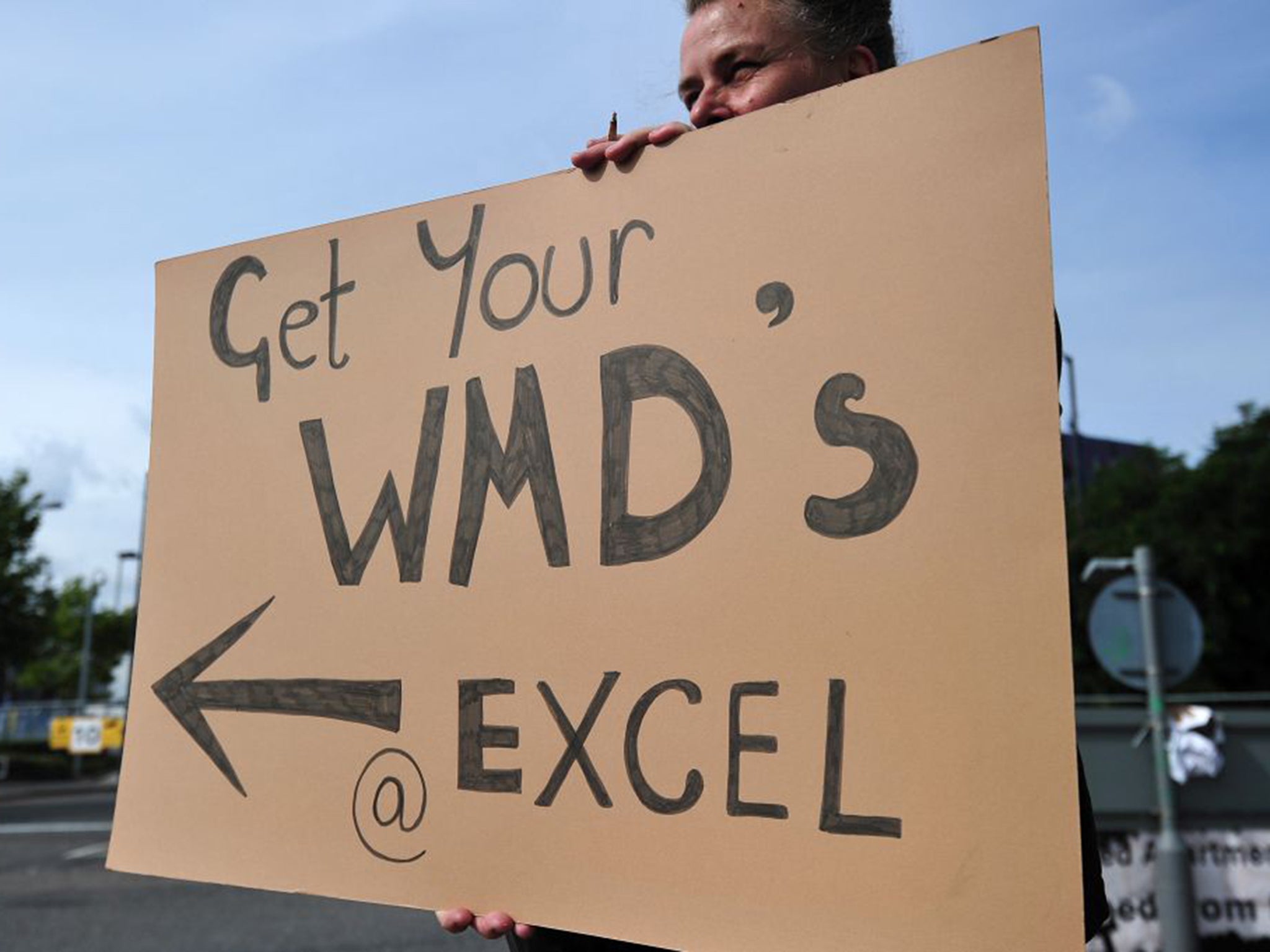The more appalling the human rights record, the better the customer at London's arms fair
Saudi Arabia was ranked 161 out of 167 on the Democracy Index. To put things into perspective, North Korea was 167

Your support helps us to tell the story
From reproductive rights to climate change to Big Tech, The Independent is on the ground when the story is developing. Whether it's investigating the financials of Elon Musk's pro-Trump PAC or producing our latest documentary, 'The A Word', which shines a light on the American women fighting for reproductive rights, we know how important it is to parse out the facts from the messaging.
At such a critical moment in US history, we need reporters on the ground. Your donation allows us to keep sending journalists to speak to both sides of the story.
The Independent is trusted by Americans across the entire political spectrum. And unlike many other quality news outlets, we choose not to lock Americans out of our reporting and analysis with paywalls. We believe quality journalism should be available to everyone, paid for by those who can afford it.
Your support makes all the difference.May 2015: It was my first time in court, and I was trying to get information on the seedier side of Bahrain’s relationship with the UK. I was the appellant. Also present was Edward Oakden, a senior British diplomat defending the Foreign Office’s Decision to withhold sensitive information on Bahrain from 1977. The official reason? The release of such information would 'prejudice' Bahrain's relationship with the UK. The reason I suspected? Most likely Britain were still desperate to sell BAE Systems’ Eurofighters to Bahrain, and any hint of embarrassing the Bahrain government might jeopardise their chances of doing that. Arms sales were a big deal, literally.
Fast forward to September 2015, when 32,000 arms dealers are expected to attend the ExCel centre in London for the Defence and Security Equipment International (DSEI). With BAE Systems as the ‘Platinum’ sponsor, this was the biggest DSEI to date, reflecting David Cameron’s ‘tireless’ promotion of the UK arms industry abroad.
As a response, Stop the Arms Fairs, a coalition of anti-arms fair individuals and organisations, organised a week of action to prevent weapons getting to the ExCel Centre in London ahead of the event's opening on the 15th. On Saturday, peaceful activists succeeded in delaying weapon-laden trucks for four hours before being removed, sometimes forcibly, by police.
It is hardly surprising people are angry. The British government's eagerness to boost arms sales meant they invited numerous states with appalling human rights records to DSEI. In fact, it seems that the more appalling the human rights record, or the less democratic the country, the better the customer. Of the top 8 buyers of UK arms, 4 of them are authoritarian states with atrocious human rights records according to Amnesty International.
Furthermore, of the 61 countries invited to this year’s DSEI, a quarter of them are ‘authoritarian’ according to the Economist Intelligence Unit's Democracy Index. These include all the Gulf countries: Saudi Arabia, Kuwait, Qatar and UAE. And let’s not forget the slightly less wealthy Bahrain, a tiny monarchy with an oppressive regime which has engaged in human rights abuses throughout the past four years that include systematic torture, extra-judicial killing, enforced disappearances, and the weaponisation of tear gas. Bahrain’s invitation to the DSEI highlights how the UK continues to play ‘the dirty role of matchmaker between trader and torturer.’
Such matchmaking is, however, lucrative. The GCC countries, all of whom are ranked by Freedom House as authoritarian, make excellent customers. Bahrain has bought £77 million worth of military equipment and dual use equipment off the UK since 2011. The UAE, a tiny country with deep pockets, has spent a staggering £6.3 billion on both military and dual use equipment in the same period, making it the UK’s biggest arms customer.
More shocking still is that Saudi Arabia, the second largest importer of UK arms, whose arms imports from the UK totalled £3.8 billion between 2011 – 2015, was noted by Freedom House to be among the 12 ‘worst of the worst’ countries in terms of civil and political rights. It was also ranked 161 out of 167 on the Democracy Index. (To put things into perspective, North Korea was 167). Despite this alarming ranking, the DSEI will be a forum for further exploiting the lucrative Saudi market, and there will be a keynote speech providing a 'comprehensive assessment of the Saudi market place and how best to establish and develop [one's] business in the Kingdom.’
This insensitive lecture, planned to be delivered by retired British officer Brigadier Jim Tanner, comes at a time when the Gulf is riddled with conflict. The GCC states (with the exception of Oman) are embroiled in a war in Yemen that has resulted in at least 4,000 deaths since it began in March 2015. Oxfam have argued that the UK is fuelling the war in Yemen by its ongoing arms sales to Saudi Arabia.
Newly elected Labour leader Jeremy Corbyn has also criticised UK arms sales to the Gulf, stating that British arms sales to the region are probably fuelling Isis, and therefore destabilising the entire Middle East.
It is therefore imperative that the UK suspend arms supplies to parties engaged directly in the Yemen conflict. Failure to do so will not only make our country complicit in the deaths of innocent civilians, but it will also lead to further destabilisation of a region that has already suffered so much at the hands of western interferers.
Marc Owen Jones is a member of Bahrain Watch and co-editor with Ala’a Shehabi of Bahrain’s Uprising: Resistance and Repression in the Gulf (Zed Books, 2015)
Join our commenting forum
Join thought-provoking conversations, follow other Independent readers and see their replies
Comments